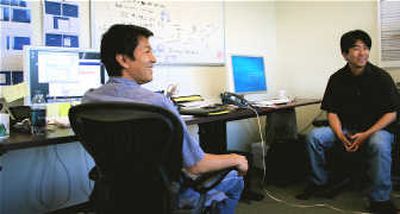Lunarr helps with team editing, workflow

A Pacific Northwest company whose name came from the idea of the two-faced moon is pushing a new Web-based way for people to collaborate on projects and group editing.
Lunarr Inc., based in Portland, has launched a Web platform that lets people work and edit files together. On one side is the edited-view version of the project. The “back” side – the innovation introduced by Lunarr – is a gathering spot for comments, e-mail, Web links and images.
It works this way:
You upload a file (of nearly any type or format) to your free Lunarr account. Or you can start with a number of provided templates.
You then have the option of editing it online, making comments and remarks or adding images, colors, whatever.
You then send your collaborators a message to have them share comments or also edit that document or file.
By clicking on the upper right “dogear” icon, one can “flip” the document to its back side. On that page, each person sharing the file can see all the messages made by collaborators, a summary of all revisions and comments, previous versions of the document and a live report on any users currently editing the document.
The current way of sharing and editing files is based on e-mail and other “1980s” methods, said Hideshi Hamaguchi, one of the founders of Lunarr.
The future of Web work will be defined by quick access, shared responsibility and document tracking, he said.
Since being launched just last month , about 1,500 files or documents have been uploaded on Lunarr, said Hamaguchi, who had been an executive with Panasonic USA before joining co-founder Toru Takasuka in the Lunarr venture.
“The front page can be anything; we tried to make it very flexible,” Hamaguchi said.
Lunarr users can import full Web pages, allowing people to look over an HTML page, share thoughts and critiques, then re-send an edited version to a network of collaborators.
“We’ve found a lot of interest among people in education and in other companies where cooperation and teamwork are key functions,” said Brett Josephson, who handles marketing for Lunarr.
Two current limitations in the editing process: edits and comments are not distinguished by using different colors or other indicators, and there’s no way to add cells or editing marks on images or graphics.
Hamaguchi said the company will offer its service as a free beta through 2008, relying on $10 million in funding to keep the operation going. Sometime next year Lunarr will start charging a monthly user fee; another level of payment will be available for corporate users, he said.
The company’s private funding comes from Takasuka, the company’s CEO, who previously founded a company in Japan, Cybozu. It became that country’s No. 1 groupware developer. When Takasuka left that company in 2005, he sold about $10 million in stock and set it aside for starting the new company.
The two men decided to base the company in the Northwest, where they said there is a strong pool of technology talent and funding.
They’ve both said they find Lunarr a reflection of the dual cultural approaches of East and West. They say the Eastern approach to working in a group is based on common and collective responsibility. The Western approach is much more individual-based, they said.
Both methods have advantages and drawbacks, and they said Lunarr will try to blend the best of both.
Said Hamaguchi, “We would like to provide a service to our customers like the moon, with two sides.”